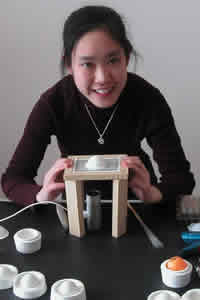
Pencilla Lang
OPTICAL TACTILE SENSORS FOR MEDICAL PALPATION
A.B.Lucas S.S.
The goal of this project is to design and prototype a fingertip-like tactile sensor for medical palpation. Doctors use palpation for many purposes. Stiffness provides information on the health of tissue (softness for cysts and hardness for tumors and scars), and aids in locating arteries and tying sutures. In minimally invasive surgery, endoscopic tools and surgical robots prevent surgeons from using palpation directly, hindering efficacy and increasing duration of procedures. Tactile sensors are required to reproduce the sense of touch and manipulate objects in a manner similar to the human fingertip. Such sensors can also enhance other remote manipulation applications.
The prototype sensor utilizes two new approaches: deformability and vision-based sensing. Hemi-spherical shells were fabricated by moulding silicone and geometric patterns were applied to the inner surface. A vision system detects the pattern and tracks the motion of features. The images are thresholded and skeletonized to segment the pattern. Pixels in the skeleton pattern are further segmented into groups of pixels representing intersection points or connecting lines. A graph model of the pattern topology was formed, and matched with a topological model of another image to determine matching features. After finding matching features, the motion of features is calculated. The resulting motion can potentially be used with a physics based model of the shell to determine deformation and forces. Alternative methods to creating deformable patterns were explored, including experimentation with the deformation of optical thin films through colour space. The prototypes demonstrate the feasibility of this optical tactile sensor design.
| Award | Value |
|---|---|
| Second Award – Eastman Kodak Company | $500 |
| An educational award of $5,000. The IEEE Oregon and Seattle sections equally support technical and gifted students in education with outstanding achievement in the area of engineering. – IEEE – Oregon and Seattle Sections | $5000 |
| Third Award of $1,000 – Engineering – Presented by Intel Foundation | $1000 |
